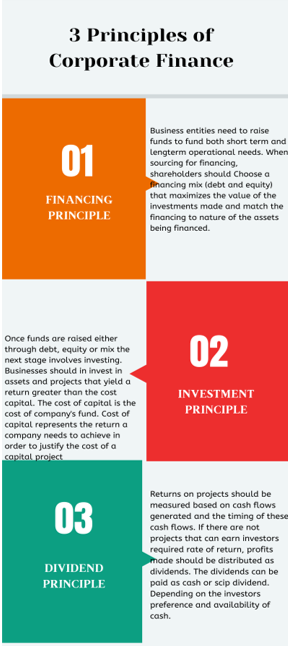
PRINCIPLES OF CORPORATE FINANCE
Introduction
Corporate Finance: is a field of finance that deals with the capital structure of entities and sources of funding, in order to maximize Shareholders’ value. The main objective of corporate finance is to understand how to enhance a company’s value by making better decisions about three factors; financing, investment, and dividend. Corporate finance is based on several principles:

Table of content
- INTRODUCTION
- PRINCIPLES
- KEY POINTS
- BIBLIOGRAPHIES
The basic Principles that every small and large organization should take into consideration include:
- A budget must be established to provide a tool for conducting various financial activities
- A budget must be realistic, reasonable, and attainable.

- Actual financial results must be compared to the budget on a regular basis
- When actual financial results vary significantly from the budget, a manager must:
- determine the cause,
- evaluate the activity, and
- take corrective action.

- Businesses must operate within their budget. Where expenditures exceed budget, justification for such excess must be provided
- Businesses must evaluate the financial consequences before a new activity is started or a current activity is changed or eliminated.
- Businesses must ensure that the anticipated benefits are greater than the costs for any planned or ongoing activities.
PRINCIPLES OF corporate Finance:
The three basic principles of corporate finance, that every SME owner should know, are:

The Investment Principle: According to this principle, an entity should invest its funds in projects or investments that give maximum Return on Investment (ROI). Before investing in any project, the finance team should prepare its financial feasibility study to assess future costs, revenues and estimated profits.
The Financing Principle: Most of the businesses are funded by a financing mix i.e. shareholders’ funds or equity and borrowed funds or loan. The financing principle states that a business owner should select such a financing mix so as to maximize the value of the investment and minimize the cost of financing.
The Dividend Principle: If there are not enough investment opportunities to invest surplus cash and earn an acceptable hurdle rate (the minimum rate that a company expects to earn while investing in a project); the money should be returned to the owner. So, the basic question is whether the excess cash should be retained in the business or given away to the owner/investor. Public listed companies pay off such cash in the form of a dividend or buy back their own shares.
Bibliography
CONCLUSION
In conclusion, an entity should invest its funds in projects or investments that give maximum Return and increase the market value of the business.
A business owner should select such a financing mix so as to maximize the value of the investment and minimize the cost of financing.
Businesses must evaluate the financial consequences before a new activity is started or a current activity is changed or eliminated.

